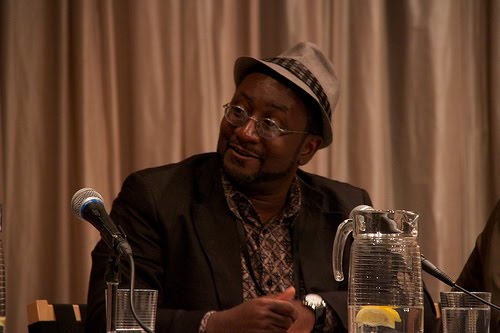Q: What part of the writing process do you hate?
A: There is no part of the writing process that I hate. I love to think about stories. I love to write stories, even long ones like novels, that may take years to complete. I love revising stories, even long ones like novels, that may take years to revise. I like doing research for stories I plan to write. I like workshopping stories with my friends who are writers and readers. I like getting feedback about my stories, even negative feedback. I like giving feedback. I like working with editors.
If there is a part of the process that I like least it would have to be trying to read my handwritten comments and fixes, and transfer them from the page to the computer. In truth, I do not dislike that part of it either, per se, but it has become more difficult because of my ever weakening vision.
Thanks,
Preston
At the Pen Festival 2010

© PEN American Center/Susan Horgan. All rights reserved. Please contact media@pen.org for usage and rights.
July 14, 2009
Rejection
Q: How do you deal with negative criticism as a writer? Does it hurt?
A: Now, I have been fortunate. Knock on wood. Most of my criticism has been positive.
To answer your question, yes, negative criticism hurts. But it is a part of being a writer, and an important part. It keeps you on your toes. It keeps you performing at a high level. It keeps you from getting comfortable and slacking off.
Furthermore, you have to put it all into perspective. We writers get rejected a lot. Rejections hurt a lot, and we get rejected a lot. So when we are reading a piece of negative criticism of something of ours that was accepted by a publisher and is published and in print, it is but one defeat after a string of many successes. In short, it is a victory to find oneself in a position to even be the object of negative criticism.
And here is something else, criticism, any kind of criticism, means that you are being read, and that is not a bad thing.
Thanks,
Preston
A: Now, I have been fortunate. Knock on wood. Most of my criticism has been positive.
To answer your question, yes, negative criticism hurts. But it is a part of being a writer, and an important part. It keeps you on your toes. It keeps you performing at a high level. It keeps you from getting comfortable and slacking off.
Furthermore, you have to put it all into perspective. We writers get rejected a lot. Rejections hurt a lot, and we get rejected a lot. So when we are reading a piece of negative criticism of something of ours that was accepted by a publisher and is published and in print, it is but one defeat after a string of many successes. In short, it is a victory to find oneself in a position to even be the object of negative criticism.
And here is something else, criticism, any kind of criticism, means that you are being read, and that is not a bad thing.
Thanks,
Preston
I want to Write
Q: I want to write but my grammar is not so good. Should I give up?
A: What? I can't answer that question. There is too much about you that I do not know. You want to write what? Poetry? Stories? A novel? Essays? Have you written anything substantial? Has anyone (aside from your family and close friends) read it?
I'm not sure what you're asking, but if you want to fix your grammar, sign up for a grammar class with the public schools or with a local community college. You might also pick up Strunk and White's THE ELEMENTS OF STYLE or some other book on grammar.
Worse than having a weakness in grammar, if you plan on becoming a writer, is having a weakness in reading. . . do you read a lot? Have you read a lot? If not, go out and start buying novels, short story collections, poetry collections, or collections and books in whatever genre of writing you aspire to work in.
I hope this helps.
Thanks,
Preston
A: What? I can't answer that question. There is too much about you that I do not know. You want to write what? Poetry? Stories? A novel? Essays? Have you written anything substantial? Has anyone (aside from your family and close friends) read it?
I'm not sure what you're asking, but if you want to fix your grammar, sign up for a grammar class with the public schools or with a local community college. You might also pick up Strunk and White's THE ELEMENTS OF STYLE or some other book on grammar.
Worse than having a weakness in grammar, if you plan on becoming a writer, is having a weakness in reading. . . do you read a lot? Have you read a lot? If not, go out and start buying novels, short story collections, poetry collections, or collections and books in whatever genre of writing you aspire to work in.
I hope this helps.
Thanks,
Preston
Subscribe to:
Comments (Atom)